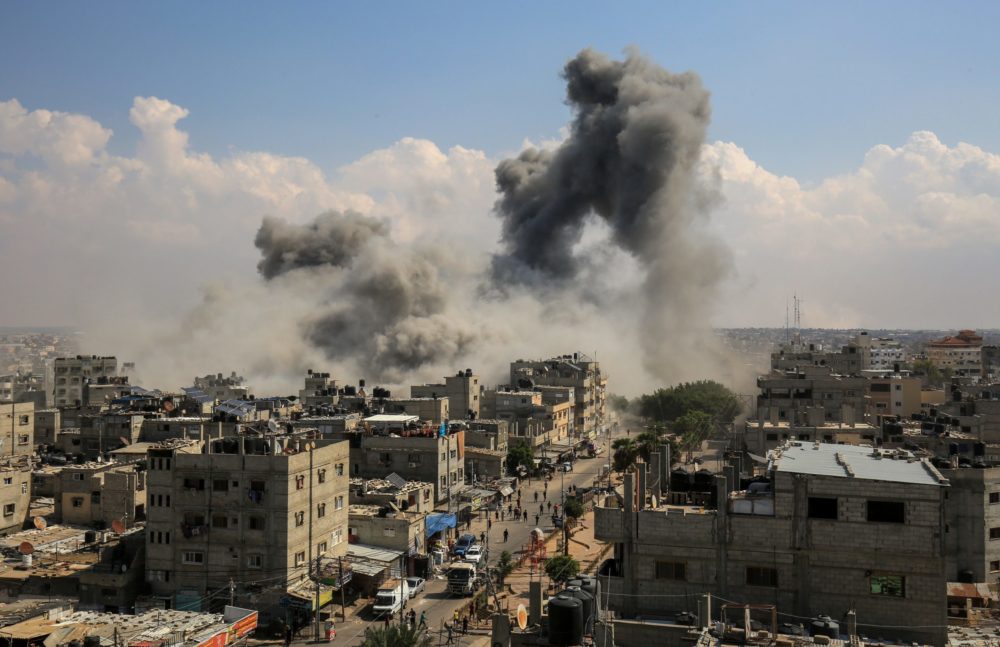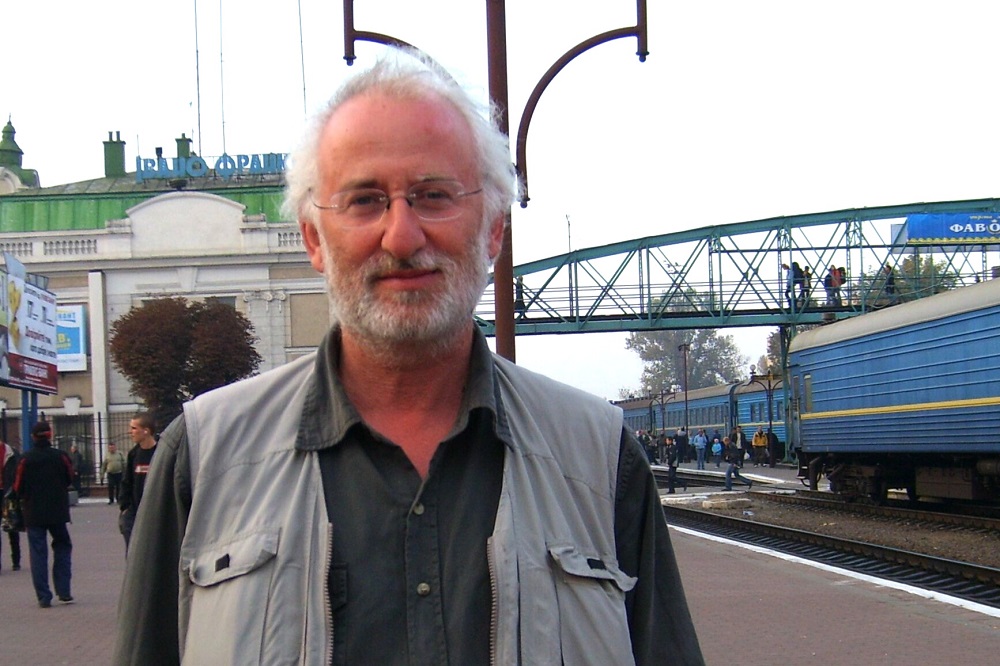Fear, despair and trauma in Gaza: a collaboration between two journalists, one Welsh and one Palestinian

Martin Shipton
A Gaza journalist who collaborated with a Welsh Jewish journalist on a project that links the Holocaust with the Nakba has recorded a new programme in which he shares the despair of thousands of Palestinians whose homes have been destroyed by Israeli bombardment.
More than 40 members of Mike Joseph’s family were murdered by the Nazis. But his own uncle’s Jewish paramilitary Palmach brigade committed atrocities as they conquered and cleared a number of Arab villages near Gaza in 1948.
Joseph, who comes originally from Cardiff and now lives near Fishguard, made a podcast series with Gaza journalist Sami Abu Salem in which they explored both the Holocaust and the Nakba (Catastrophe), in which more than 700,000 Palestinians were expelled from their homes or fled around the time that the state of Israel was founded.
In a new collaboration over Zoom called Gaza: A Story of Love and War , Sami, who together with his family has been made homeless by an Israeli bomb, explains to Mike what daily life is now like in Rafah, where many thousands of Gazans have been herded and await the possibility of an Israeli onslaught, with nowhere else to go.

In an extract from the programme, Sami says: “Imagine, Mike. Imagine that people find no room in Rafah to install their tents. They put their tents where? In Hamas military posts. But actually Hamas evacuated the posts. They escaped. It is very risky. People put the tents inside the posts. Imagine, because there is no room, and because there is a toilet in the post. There is toilet, there is a pipe of water and things like this.
“My brother in law, his name is Muhammad Musleh, came from Maghazi [elsewhere in Gaza] to Rafah. Then he stayed in a tent. Then he left. He took his family and they left, went back to Maghazi. But before that, he went alone to inspect his house. And he was shocked to see that his house is totally burned. Anyway he returned to Rafah and took his family, his mother, his wife and his daughter. She is physician and his son, who is engineer, went back to Maghazi.
“I told him it is very risky. He said, yes, I know, very risky. But risk is everywhere. And I’m leaving. And he left. He said, I cannot stay in a tent like this in cold. And no toilet. No restroom. There is a problem with the girls. When they would like to use the restroom, knock the door of other houses. Excuse me, can I use your restroom? Because there is no restroom in the tent. And he is asking me to come to Maghazi. I can’t go and I cannot stay here.
“For long days I have not slept on a mattress. I’m sleeping on tiles, just on blankets.I have some money to buy mattress, but I keep them just in case. For travelling, for buying food or medication, or any essential thing. I am embarrassed to feel that I am a beggar, despite I’m in need for that. There is a medical problem. I think I have flu because I slept in a tent.
“I’m divided between a tent and a room, by the way, me and my family. There is a problem here and there are dermatitis, skin problems, because of lack of cleaning, because of lack of water. We have water here at home three hours a week. In the three hours we rush and fill everything. That’s why for four months I didn’t have proper hot shower. Believe it or not. I wash my body just to avoid diseases and to avoid bad smell, to keep my skin clean.
“But it is not easy, because I fill a vessel and put it in fire. Look for wood for fire, make it warm. Then I use a smaller vessel to pour on my head and my body. But real proper shower no. It has become a dream.
“And also I have a problem with my mother. She uses elderly diapers [nappies] which I cannot find. And here the prices are horrible. I cannot find it. Even the diapers for kids. It was about $8, $7, now about $40. Sometimes I find some of them which are smaller than what we need. But we use tape to fix it on the body of my mother. Lots of humans details which make life here impossible.”

One night Sami tells Mike: “I’m near the fence between Egypt and Gaza. It’s dark now, the lights of the borders sitting along the border, which is about 14km. But we are on the western part, which is not far from the sea. Anyway, it is very cold.
“People are in the tents. And some of them dismantled their tents and left the area because they are scared that the Israeli forces are coming to invade Rafah. And yesterday and today, me and my wife and family and brother, and others were discussing should we leave or not? And if we’d like to leave, where to go? All the Gaza Strip is under bombing.
“Even Rafah is under bombing. We don’t know what to do. To leave or not to leave, that is the question. And even my kids are asking me, shall we leave Rafah? If yes, where to go? It is strange that some people are coming from the middle areas of the Gaza Strip and coming to Rafah because it is less danger. But people also from Rafah are leaving. They are carrying their stuff, mattresses, blankets, cooking gas, some food, some flour.
“I asked one of them, where are you going? He said, we are leaving Rafah because the Israelis are coming. They are going to make massacres. I asked, where are you going? He said, I don’t know, just I would like to leave. When he says I don’t know, it means he is going to stay. Maybe he will sleep in the street to find any place to make his tent or to find any guy to stay in a room or no clear answer. No clear answer.
“So we are living in despair and in horror. Some people left Rafah and went back to their homes and they said bombing is everywhere. The Israelis are coming to Rafah, So it is more dignity to die at our homes. You cannot blame them. I cannot blame them and I cannot blame anybody who stays. So if somebody stays in Rafah, he’s correct. And if somebody left Rafah to another place, to Nuseirat, to Deir el Balah, to Maghazi, also he’s correct. And both also are not correct. We thought, if there is an invasion to Rafah, what to do?
“If we were here to go to the Egyptian borders, maybe the Israelis will push people to the Egyptian borders. There is a horrible thing even to stay in Rafah, which means that we are guilty. We put our kids in danger. We may die or they may die or to leave to other place But the other place would be bombed. Nobody knows.
“I can say that they are one million and a half of beggars. They are ordinary people. I am one of them. Ordinary people. Journalists, physicians, engineers, workers, teachers, painters, artists, drivers. Ordinary people among their families.
“They don’t know what to do. Everybody is walking and looking at the eye, looking into the eyes of the other in the street. And when somebody shake hand with other. How are you? Are you staying in Rafah or leaving? The answer I don’t know. Like what happened with me today.
“Some people who I know, they are from north. Sami, are you staying in Rafah or leaving? I said I don’t know and they don’t know also.”
Support our Nation today
For the price of a cup of coffee a month you can help us create an independent, not-for-profit, national news service for the people of Wales, by the people of Wales.





